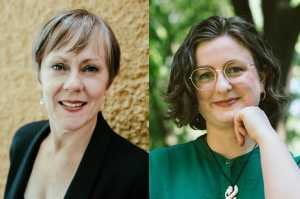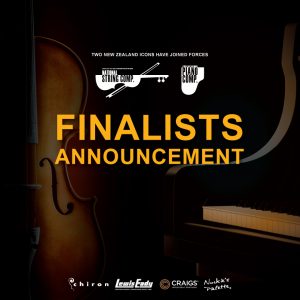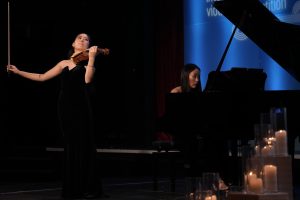 We sat down with Sarah Watkins and Gracie Francis – our collaborative pianists for the 2024 National String Competition – to talk about what it’s like to work with a large number of young artists with a limited amount of rehearsal time…the challenges, the joys and the myriad of things that both competitor and accompanist learn through the process.
We sat down with Sarah Watkins and Gracie Francis – our collaborative pianists for the 2024 National String Competition – to talk about what it’s like to work with a large number of young artists with a limited amount of rehearsal time…the challenges, the joys and the myriad of things that both competitor and accompanist learn through the process.
How are you feeling about being one of the collaborative pianists for the 2024 National String Competition?
Sarah:
First of all, I want to say how excited I am to be involved with the National String Competition again. I was involved in the first outing of the Competition a couple of years ago – and I’m looking forward to no Covid interruptions this time around! In 2022 there were all manner of travel restrictions and postponements, meaning some competitors couldn’t come. It’s great to have a full contingent of 15 semi-finalists – I can imagine how excited they all must be to take part in the competition.
I’m really looking forward to sharing the responsibility with Gracie Francis – it’s so wonderful to have her on board as the other official accompanist – and also to welcome the other artistic collaborators that are involved with the National String Competition and the National Piano Competition too. So much amazing music to be enjoyed!
Gracie:
I’m really grateful that Sarah Watkins suggested me for this role. Unlike Sarah, it’s my first time doing something like this – it’s a big undertaking to play for so many people, and such an important skill to develop as a collaborative pianist. It’s really cool to play for young people and to be part of their journey towards becoming confident performers. I remember being a young person in New Zealand, feeling all the different feelings a competition setting brings – those experiences are a big part of that journey.
I think a large part of being a collaborative pianist is caretaking. It’s half music, and half being an encourager of the person I’m playing with. I’m there to help them feel that they’ve got this and give them the security they need to show their best artistry and skill in performance. I want them to feel that I always have their back – I’m not only there to play the music, but also to support them.
Last year I was a studio pianist for Catherine Cho’s pre-college students (at Juilliard), and it was a really valuable learning process for me. It helped me realise that the relationship between me and the string player starts as soon as they come through the door for our first rehearsal, before we even play anything! The unique thing about doing this in a competition setting is that we only have one or two days to pull this relationship together – but it’s totally possible to do it in a short space of time and to trust each other.
What are some of the challenges of accompanying a large number of string players at a competition like this?
Sarah:
One of the big challenges for myself and Gracie as accompanists is getting to know these young artists in a short amount of time. Although I have met some (but not all) of the semi-finalists that I’ll be working with – many through my work at the University of Auckland – Gracie may not have met any of hers. As it happens, I am playing with most of the cello semi-finalists at this year’s National String Competition – we looked carefully at the practicalities of how to best share the workload, and a lot of it was based on repertoire that we both already knew.
Of course, familiarity with your playing partner is nice, but if any of these young performers are considering going on to other international competitions, or festivals, they will have to get used to working with new pianists in a very limited amount of time. That’s the beautiful thing about artists of this calibre – through collaborating with other artists in a limited period, they learn the flexibility that’s required in this industry and they’ll take new skills away with them. At all festivals, musicians are thrown together with minimal rehearsal time and they have to learn how to communicate and collaborate. So much of this communication is unspoken – you take one another’s lead, have a discussion, figure out how to make things work best.
As collaborative pianists, we quickly develop a sympathetic musical understanding of our playing partners. Each semi-finalist brings their own ideas and experience to the table – and while I have performed nearly all of these works many, many times, what I love is the challenge of working with someone and taking on board their ideas. It keeps the music fresh and alive for me.
So much of the repertoire in the National String Competition is real duo repertoire – an equal partnership between the two performers – but as a competition accompanist you’re doing what you can to support and allow the string player to shine. I love helping these performers play at their very best – it’s a big responsibility, but I love it!
Gracie:
Just like the students who are playing, it’s an opportunity for me to build new skills – in my case, a broader foundation of repertoire. There’s also a specific way of preparing the repertoire, because I have to know the pieces really well so that my whole brain can be with the person who’s competing. In rehearsals I’ll get a feel for each player’s unique sound and level of projection, and I then I can adjust to play with a different balance or colour based on what I hear from them. Focusing on those things is only possible when I know the repertoire really, really well.
For me, collaborating with younger musicians is unique because often the younger players are playing pieces which are just as advanced as the older/more senior players. It might be their first foray into playing a virtuoso work, or duo sonata… I find that to be a very special process, a discovery for them in becoming their artistic self. It’s bigger than just learning a difficult piece, or presenting it under the pressure of competition. It’s a stepping stone which could be completely formative or even transformative, where they find out something new about themselves. Those discoveries are essential on their trajectory as a musician and a person.
Tell us a little bit about your background and how this led to your involvement with the National String Competition.
Sarah:
I’ve had a long association with Anne Rodda and the Hill family’s musical endeavours – in fact from day I have accompanied at the Michael Hill International Violin Competition since day one. I was living in New York, finishing up my studies, and Anne invited me – along with Terence Dennis – to accompany half of the semi-finalists in the inaugural MHIVC in 2000, so I flew back to NZ during my summer break to take part. For the first few Michael Hill Competitions I still knew some of the competitors from my time in the US – through Juilliard, various music festivals or through their teachers.
Both the Michael Hill International Violin Competition and the National String Competition do such a wonderful job in supporting high quality string playing, with the National String Competition providing a great platform for emerging artists at a national level. The multi-round competition format, where players are required to present three different programmes – not just a one-off performance – is a great chance to hone and craft a young musician’s artistry and performance skills. It’s such a great learning opportunity, that will no doubt inspire those considering applying for competitions further afield.
Gracie:
As I mentioned earlier, Sarah Watkins suggested me for this role. I’m currently doing my doctorate at Juilliard, having finished my Masters there where I studied with Jonathan Feldman, who also taught Sarah. Sarah was Jonathan’s first student at Juilliard, and I’m the first Kiwi he’s taught since then!
Sarah is such a pioneer for collaborative pianists in New Zealand – she’s laid a path, a legacy of collaborating, and I feel very honoured to work alongside her and to benefit from her experience.
One of the main reasons I ended up being a collaborative pianist – and in particular accompanying violinists – is that my twin sister is a violinist, she plays in the symphony orchestra in Hamburg. I’ve had a head start on the Competition repertoire by playing through it with her while visiting Germany earlier this month!


